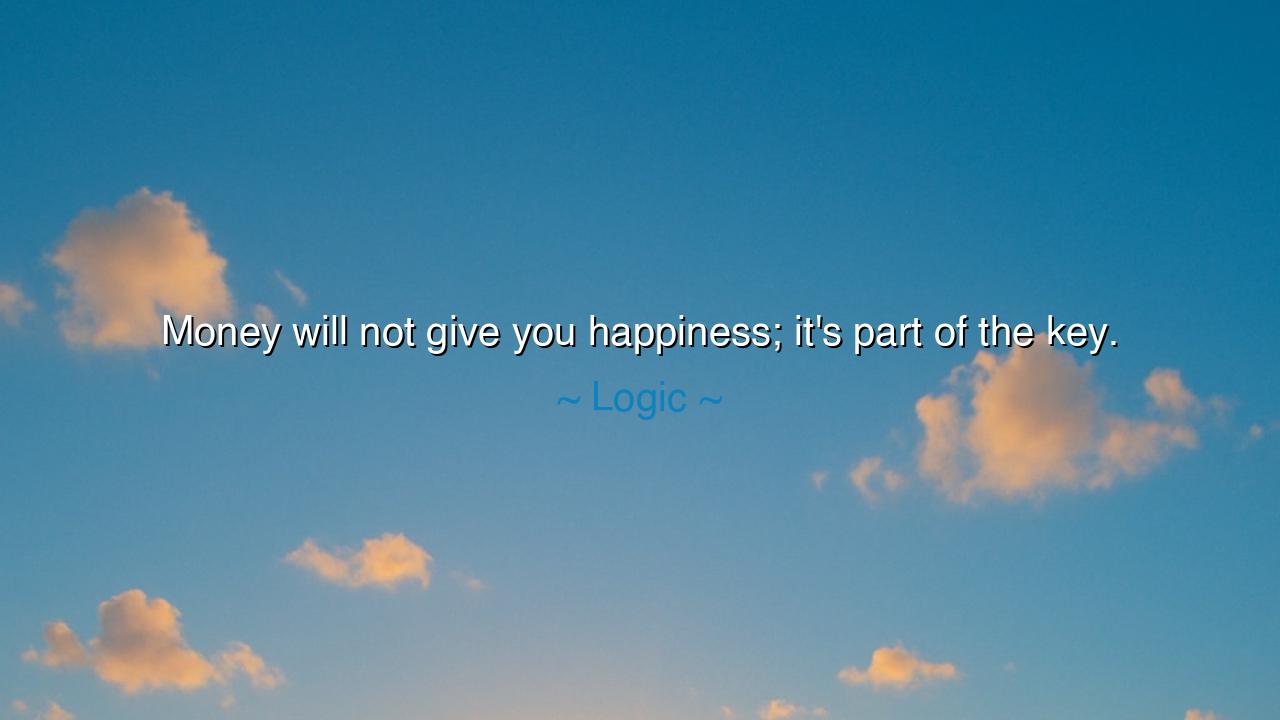
Money will not give you happiness; it's part of the key.






“Money will not give you happiness; it’s part of the key.” — Logic.
Thus spoke Logic, the poet of modern struggle, whose verses rise from the crossroads of poverty and fame, of longing and realization. In these few words, he reveals a truth that the wise of every age have sought to grasp — that money, though powerful, is not the treasure itself, but merely one piece of the key that opens the door to fulfillment. Many chase wealth as if it were the sun that lights all things, but Logic reminds us that without inner peace, love, and purpose, gold is only glitter upon the dust. Yet neither does he condemn money, for he knows — as all who have tasted both hunger and abundance know — that while it cannot buy joy, it can build the ground upon which joy may stand.
The origin of this quote lies in Logic’s reflections on his own life — a journey from hardship to success, from sleeping on floors to standing before thousands. Born Sir Robert Bryson Hall II, he grew up amid poverty, violence, and chaos, and learned early that survival often demands resources the heart alone cannot provide. When he rose to fame through his music, he discovered what so many before him have learned: that the emptiness within cannot be filled by money, but neither can true peace grow easily without it. Thus, he speaks not as one who theorizes, but as one who has walked both deserts — the desert of want and the desert of wealth — and found that happiness requires balance between the material and the spiritual.
For centuries, thinkers have wrestled with this same paradox. The philosopher Epicurus, often misunderstood as a lover of luxury, taught that true pleasure is not in riches, but in contentment — yet he also knew that freedom from need is necessary for tranquility. Money, then, is not the root of evil nor the seed of bliss, but a tool — a means of securing the time and space in which virtue and joy may flourish. Logic’s wisdom echoes this ancient truth: that the coin can buy the bed, but not the sleep; the house, but not the home; the feast, but not the appetite of the soul. The wise man uses money as the servant of purpose, while the fool lets it become his master.
History, too, bears witness to this balance. Consider Andrew Carnegie, one of the richest men of his age. Born into poverty, he built an empire of steel and amassed unimaginable wealth. Yet in his later years, he came to see that riches without generosity were a hollow victory. He spent the rest of his life giving away his fortune — building libraries, universities, and cultural institutions for others. His happiness did not come from the gold he gathered, but from the good he could create with it. Thus, his story stands as a living echo of Logic’s words: money alone cannot give happiness, but it can unlock the means to pursue it rightly.
And yet, let none be deceived: happiness cannot be purchased. The one who believes that luxury will mend the wounds of the heart will find that desire is a well that deepens with every sip. The more one drinks, the more one thirsts. For joy, unlike wealth, cannot be stored — it must be lived, and shared. True happiness arises when money serves meaning — when it feeds the hungry, shelters the weary, nurtures creativity, or grants freedom to the spirit. Without love, gratitude, and purpose, even the richest man is a beggar before life.
Logic’s insight carries both humility and clarity. He does not dismiss money as worthless, for he has known the pain of lacking it. He does not glorify it, for he has felt its emptiness. Instead, he calls us to wisdom — to recognize that the key to happiness is forged of many metals: love, health, creativity, peace, and yes, money too. But without the others, this single piece cannot open the gate. Money can silence the noise of survival, but it cannot write the song of the soul.
So let this be the teaching: Honor money, but do not worship it. Earn it with integrity, spend it with intention, and use it as a bridge between your dreams and your purpose. Let your wealth, however small, be the river that nourishes others, not the flood that drowns your heart. Remember that the richest life is not measured in gold, but in gratitude. And when you find yourself tempted to chase fortune alone, recall the wisdom of Logic: “Money will not give you happiness; it’s part of the key.” The other parts are found in love, in service, in courage, and in faith — the treasures that no currency can buy, but that make all riches worth possessing.
Thus, seek not the glitter of gold, but the harmony of heart and purpose. For only when wealth and wisdom walk hand in hand can the gates of happiness truly open.






AAdministratorAdministrator
Welcome, honored guests. Please leave a comment, we will respond soon